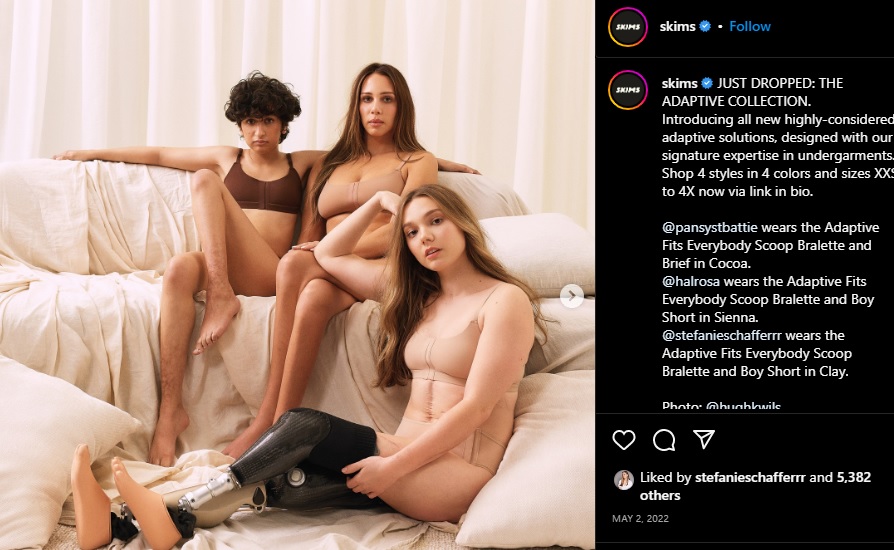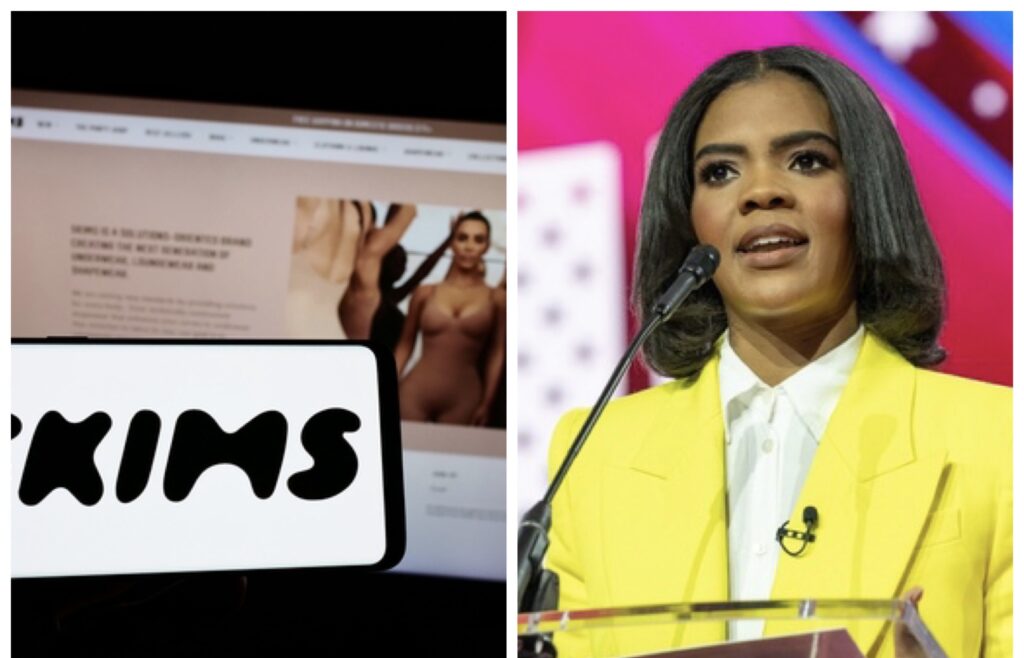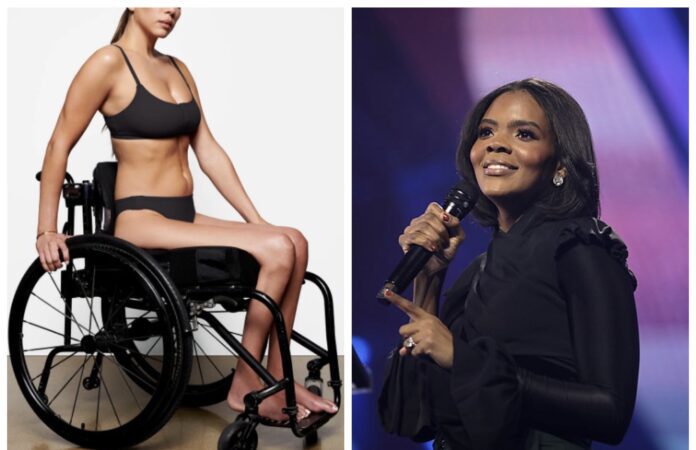Editor’s Disclaimer: The comments (of Candace Owens) reported in the following article may be shocking for some to read. AmeriDisability does not support hatred or discrimination.
Discriminatory comments made last year by Candace Owens, a popular political analyst, have resurfaced following fresh criticism by actress Christina Applegate. Applegate, who has been vocal about her multiple sclerosis (MS) diagnosis, just recently discovered the previously released video-commentary of Owens spewing disparaging remarks about Kim Kardashian’s Skims’ adaptive undergarment line and, more specifically, the entire disability community.
In May 2022, Skims, the undergarment brand owned by media personality Kim Kardashian, launched its Adaptive Collection to offer customers accessibly constructed intimate apparel. Designed with those with limited mobility in mind, the line features an array of adaptive garments like a scoop bralette, thong, brief and boy short, with sizes ranging XXS to 4X.
When Skims’ Adaptive Collection hit the market with its inclusive campaign, Owens didn’t shy away from sharing her disapproval. Skims’ advertisements included: Haleigh Rosa, a former reporter and founder of the For Everyone Foundation, serving people with spinal cord injuries and paralysis; Stefanie Schaffer, a bilateral amputee who authored the memoir Without Any Warning: Casualties of a Caribbean Vacation; and Pansy St. Battie, a burlesque performer who was born with hypermobility syndrome, a connective tissue disorder that impacts joints.

In her unsolicited rant, Owens said, “I don’t really understand how far we’re going to take this inclusivity thing. I really don’t get it. I don’t know. If I’m wrong, again, educate me. Today, I just want to be educated in the comments. If people that are in wheelchairs were thinking as they were looking around ‘you know what really upsets me… that I’ve never seen a bra and underwear advertised with a girl in a wheelchair.’ … Why did they [Skims] do this? I don’t know, I don’t know why this needs to be done. I’m getting tired of this all-inclusivity thing. It seems ridiculous.”
Owens then proceeded to use a mocking tone to convey her perception of what disabled and/or injured people think about representation. She unapologetically continued, “I didn’t know we had to see that [people with disabilities] in our face. And now we’re going to have to look forward to campaigns where women that are in wheelchairs are now wearing bras and underwear because, we as a society, just cannot get to the bottom of our ridiculousness.” Owens then claimed that she would fire the brainchild of Skims’ marketing campaign. Ouch!
Candace Owens Has Her Panties Twisted
In response, the featured models shared their personal perspectives about how having more access to inclusive representation would have been (and still is) beneficial for them — and all people with and without disabilities. The disability community is actually the largest minority group in America and, thus, an identity that will likely affect most, if not all, Americans at some point in their lives.
Since she attested a willingness to be educated on the need for inclusion, Owens should probably learn that inclusively-designed products are, undoubtedly, in demand. In the U.S. alone, at least 61 million (or roughly 1-in-4) adults live with a disability, according to the Centers for Disease Control and Prevention (CDC). So, there’s already a high demand for accessible goods, which is expected to grow substantially to, eventually, rack up billions in sales thanks to the purchasing power of people with the disabilities (who likely purchase their fair share of underwear like any other consumers).

(Shutterstock)
The Impact of Discriminating Remarks
To say there’s a lack of representation of people with disabilities in the media, including high-profile media campaigns, is an understatement. For example, even though 26% of American adults have some type of disability, only 2.4% of all speaking or named characters in films are shown with a disability, according to a study by the USC Annenberg School for Communication and Journalism. The staggering gap between 2.4% and 26% is unacceptable and perplexing. For those who chalk Kim Kardashian up to just be a superficial reality TV star, note that it appears as though she (and her company’s marketing department) understands the need for diverse representation more so than many other mainstream media moguls.
Listen, anyone and everyone can be stereotyped but, perhaps, people with disabilities are more so faced with busting myths. Owens has 1.28 million followers on YouTube and 5.4 million followers on Facebook; so, unfortunately, her strong opinion about panties has an impact. Her harsh words, seemingly rooted in misinformation and misunderstandings about what it’s like to live with a disability, influence the attitudes and biases of others. Owens clearly does not seem to grasp the challenges that people with physical disabilities often encounter while trying to independently go about their day, including dressing themselves. Why is she so triggered by underwear designed for customers who prefer accessibility? No one is forcing Owens to wear a pair of Skims, so why is she so outraged by these undies and the people who wear them?
— v (@ViralMaterialz) March 22, 2023
Just months after Owens’ attack of Skims and the entire disability community, she came under fire again thanks to a viral photo of her wearing a “White Lives Matter” shirt at a fashion show alongside Kanye West, who just so happens to be Kardashian’s ex-husband. It seems that Owens has ill-will against people with disabilities and those who support people with disabilities – which, in this case, is Kardashian and her inclusively-minded creative team.
In response to backlash over her discriminating remarks, Owens posted a video in an attempt to defend herself and deny the accusation that she’s ableist. Again, since she proclaimed to welcome schooling on the subject, she may want to study up on ableism. Her hostile comments about inclusion being “ridiculous” seem to match the very definition of ableism which, as explained by Merriam-Webster’s dictionary, is discrimination or prejudice against individuals with disabilities.
Sorry Candance Owens… but the disability community (and the community at large) aren’t buying what you’re selling. But they might just buy some Skims from Kim Kardashian thanks to you.






